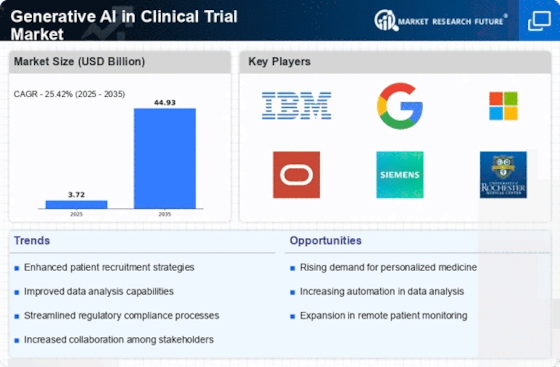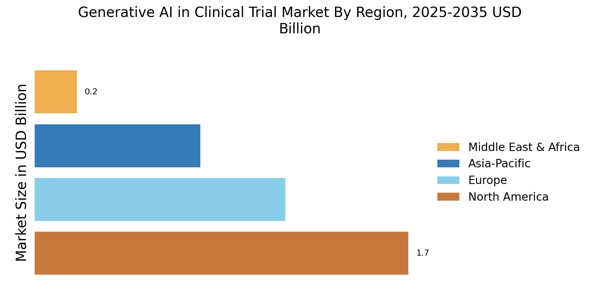Innovative Trial Designs
The Generative AI in Clinical Trial Market is increasingly characterized by innovative trial designs that leverage AI capabilities. These designs allow for more adaptive and flexible approaches to clinical research, enabling researchers to modify protocols based on real-time data insights. This adaptability can lead to more efficient trials that are better aligned with patient needs and treatment responses. Emerging trends indicate that trials utilizing generative AI for design optimization may experience higher success rates and reduced dropout rates. As the industry continues to explore the potential of AI-driven methodologies, the evolution of trial designs is likely to reshape the future of clinical research.
Enhanced Patient Engagement
The Generative AI in Clinical Trial Market is witnessing a notable shift towards enhanced patient engagement strategies. By leveraging AI-driven tools, clinical trial sponsors can create more personalized communication channels with potential participants. This approach not only improves recruitment rates but also fosters a sense of community among participants. According to recent data, trials utilizing AI for patient engagement have reported up to a 30% increase in participant retention. The ability to tailor information and support to individual needs appears to resonate well with patients, thereby enhancing their overall experience. As the industry continues to evolve, the integration of generative AI technologies is likely to play a pivotal role in shaping patient-centric trial methodologies.
Accelerated Drug Development
The Generative AI in Clinical Trial Market is poised to significantly accelerate drug development processes. By utilizing AI algorithms to analyze vast datasets, researchers can identify potential drug candidates more efficiently. This capability not only shortens the time required for preclinical studies but also enhances the accuracy of predictions regarding drug efficacy and safety. Recent analyses suggest that AI-driven approaches could reduce the average time to market for new drugs by as much as 25%. As pharmaceutical companies increasingly adopt generative AI technologies, the landscape of drug development is likely to transform, leading to faster delivery of innovative therapies to patients.
Cost Reduction in Clinical Trials
Cost efficiency remains a critical concern within the Generative AI in Clinical Trial Market. The integration of AI technologies has the potential to significantly reduce operational costs associated with clinical trials. By automating data collection and analysis, organizations can minimize the need for extensive manpower and resources. Reports indicate that trials employing generative AI can achieve cost savings of up to 40% compared to traditional methods. This financial advantage is particularly appealing to smaller biotech firms, which often operate under tighter budgets. As the industry continues to embrace AI solutions, the prospect of reduced costs may encourage more organizations to initiate clinical trials, ultimately benefiting patient access to new treatments.
Improved Data Integrity and Compliance
Data integrity and regulatory compliance are paramount in the Generative AI in Clinical Trial Market. The application of AI technologies can enhance the accuracy and reliability of data collected during trials. By employing advanced algorithms to monitor data in real-time, organizations can quickly identify discrepancies and ensure adherence to regulatory standards. This capability is particularly crucial in maintaining the trust of regulatory bodies and stakeholders. Furthermore, the use of generative AI can streamline the documentation process, making it easier for organizations to demonstrate compliance. As regulatory scrutiny intensifies, the ability to maintain high data integrity through AI solutions may become a key differentiator for successful clinical trials.

















